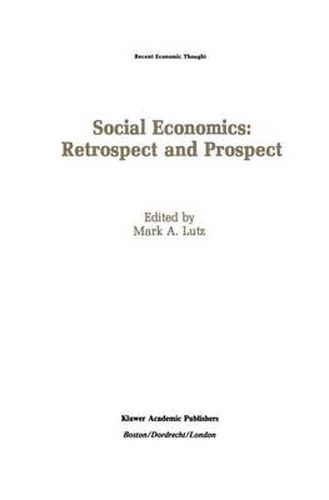Readings Newsletter
Become a Readings Member to make your shopping experience even easier.
Sign in or sign up for free!
You’re not far away from qualifying for FREE standard shipping within Australia
You’ve qualified for FREE standard shipping within Australia
The cart is loading…






This title is printed to order. This book may have been self-published. If so, we cannot guarantee the quality of the content. In the main most books will have gone through the editing process however some may not. We therefore suggest that you be aware of this before ordering this book. If in doubt check either the author or publisher’s details as we are unable to accept any returns unless they are faulty. Please contact us if you have any questions.
At the very heart of the conception of the present volume lies the conviction that social economics is a highly pluralistic discipline, inspired and enriched by several often radically different world views, Schumpeterian visions, and at times even quite antagonistic social doctrines. Yet, in spite of all these differences, social economists can nevertheless be seen and also approached as some kind of economic brotherhood for various reasons dissatisfied with the austere value-free diet offered by the pOSitivistic neoclassical paradigm. What all social economists seem to have in common is a profound interest in values and the process of valuation in order to more fully understand both economic behavior and the possibilities of improving the economic system. Such a distinguishing characteristic is also well articulated and enshrined in Article I of the Constitution of the Association of Social Economics where we are told that the aims and objectives of the Association shall be: 1. To foster research and publication centered on the reciprocal relationship between economic science and broader questions of human dignity, ethical values, and social philosophy, [and to] encourage the efforts of all scholars who are dedicated to exploring the ethical presuppositions and implications of economic science. 2. To consider the personal and social dimensions of economic problems and to assist in the formulation of economic policies consistent with a concern for ethical values and pluralistic community and the demands of personal dignity.
$9.00 standard shipping within Australia
FREE standard shipping within Australia for orders over $100.00
Express & International shipping calculated at checkout
This title is printed to order. This book may have been self-published. If so, we cannot guarantee the quality of the content. In the main most books will have gone through the editing process however some may not. We therefore suggest that you be aware of this before ordering this book. If in doubt check either the author or publisher’s details as we are unable to accept any returns unless they are faulty. Please contact us if you have any questions.
At the very heart of the conception of the present volume lies the conviction that social economics is a highly pluralistic discipline, inspired and enriched by several often radically different world views, Schumpeterian visions, and at times even quite antagonistic social doctrines. Yet, in spite of all these differences, social economists can nevertheless be seen and also approached as some kind of economic brotherhood for various reasons dissatisfied with the austere value-free diet offered by the pOSitivistic neoclassical paradigm. What all social economists seem to have in common is a profound interest in values and the process of valuation in order to more fully understand both economic behavior and the possibilities of improving the economic system. Such a distinguishing characteristic is also well articulated and enshrined in Article I of the Constitution of the Association of Social Economics where we are told that the aims and objectives of the Association shall be: 1. To foster research and publication centered on the reciprocal relationship between economic science and broader questions of human dignity, ethical values, and social philosophy, [and to] encourage the efforts of all scholars who are dedicated to exploring the ethical presuppositions and implications of economic science. 2. To consider the personal and social dimensions of economic problems and to assist in the formulation of economic policies consistent with a concern for ethical values and pluralistic community and the demands of personal dignity.